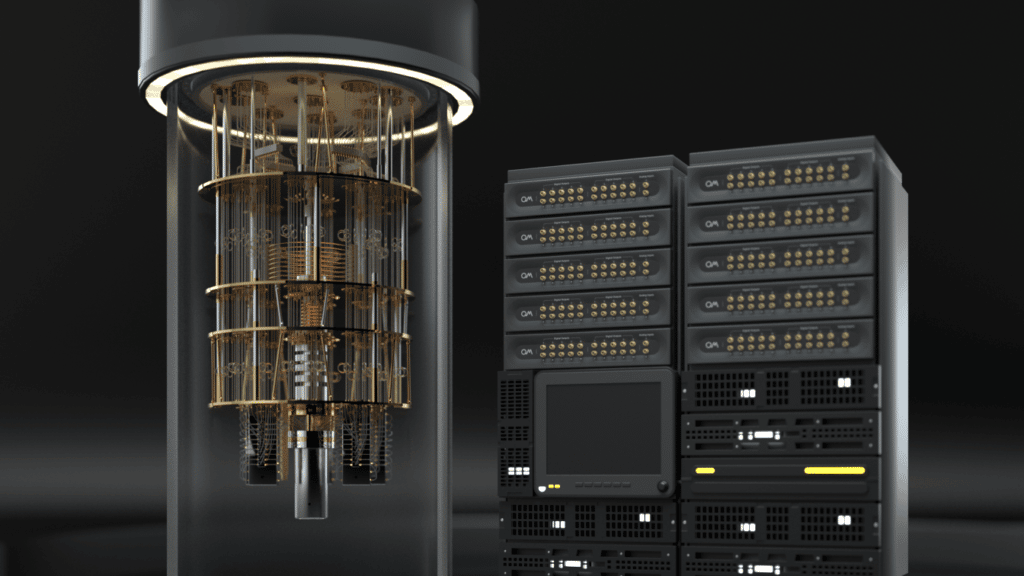APS March Meeting 2021 and Quantum Machines: Tune In to Our Scientific Program
As a company built by physicists for physicists, the most exciting time of the year for us is, obviously, March. The APS March Meeting is our Christmas, our Hanukah, and all holiday seasons combined. When the 2020 March Meeting was canceled at the last minute as the COVID-19 was just starting to make waves in the US and Europe, we were heartbroken. If for some weird reason you’re not a physicist, just imagine yourself as a kid who’s told Christmas is canceled. Well, 2020 is finally behind us, and 2021 brings with it some exciting news and vaccines (yay science!) and also, a brand new APS March Meeting!
This year’s March Meeting will take place online in a virtual format and our quantum team has prepared quite a program for it. So if you’re a quantum experimentalist looking to optimize the control of your qubits and push beyond the standard quantum limits, here are the scientific talks and workshops you shouldn’t miss.
Before we dive in, please note that the time zone is Central Daylight Time, USA.
Quantum Orchestration Workshop: Integrated hardware and software for design and execution of complex quantum control protocols

Join our quantum physicists for a workshop demonstrating the Quantum Orchestration Platform. The hardware and software platform combines a unique processor architecture that allows the most cutting-edge real-time control capabilities with an intuitive, cross-platform pulse-level control programming language, QUA. This workshop introduces the platform, shows how it can control various setups, and presents live code examples in QUA, including multi-qubit feedback and complex control.
Workshop dates: Monday, March 15, Tuesday, March 16, Wednesday, March 17
Time: 10 AM – 11 AM (CT)
Counting Photons On-the-Fly with the Quantum Orchestration Platform

Abstract: As quantum computing technology advances, experiments are becoming more complicated and require a more sophisticated orchestration of control, measurements, signal processing, and real-time decision making. The Quantum Orchestration Platform is a new comprehensive hardware and software platform for running extremely complex experiments and algorithms on quantum hardware using an intuitive, yet highly expressive pulse-level programming language, QUA. In this talk, we illustrate the use of the Quantum Orchestration Platform in a recent experiment demonstrating a number resolved photocounter for propagating microwave mode, which utilized complex real-time flow control and ultra-low latency feedback [1].
[1] R. Dassonneville, R. Assouly, T. Peronnin, P. Rouchon and B. Huard, “Number-resolved photocounter for propagating microwave mode”, PRA 14, 044022 (2020).
Tune in on Monday, March 15, at 4:24 PM
More details about the session here.
Real-time, adaptive quantum sensing with the Quantum Orchestration Platform

Abstract: NV-center-based Quantum sensors have created a lot of interest in recent years due to their potential to provide an unprecedented combination of sensitivity and spatial resolution. To improve their performance and reach optimal sensitivity and measurement time, adaptive protocols in which control and measurement parameters are updated in real-time have been proposed, and some were recently demonstrated. Here we demonstrate how such protocols can be performed using Quantum Machines’ Quantum Orchestration Platform, which allows intuitive programming and significantly improved performance and feedback latency. Moreover, we discuss new protocols previously unexplored that can be performed with the platform.
Tune in on Monday, March 15, at 5:48 PM
More details about the session.
Exciting qubits and excited quasiparticles: the effect of actively pumping a qubit on its environment

Abstract: In recent years, sophisticated control schemes for exploring and, moreover, reducing noise in quantum devices are being heavily investigated. Two important noise mechanisms in superconducting circuits that are being explored extensively and for which such control schemes have been employed, are quasiparticle tunneling and two-level systems. Here we shed more light on the subject by utilizing the Quantum Orchestration Platform, a unique control platform that provides ultra-low-latency feedback and great programming flexibility, to carefully design control sequences and explore their effect on the quasiparticle environment of a superconducting fluxonium qubit. We show striking results that demonstrate a highly non-linear environment with non-exponential and very low decay rates.
Tune in on Tuesday, March 16, at 10:24 AM
More details about this session.
Booting a quantum computer: A QUA-based graph framework for automatic qubit calibration, measurement, and execution of hybrid classical-quantum algorithms

Abstract: Deploying algorithms on real-world quantum computers requires calibration and optimization steps, the complexity of which scales with the system’s size. These typically involve an interplay between quantum circuit execution on quantum hardware and classical processing of results on classical hardware. Interestingly, some of the most promising candidate algorithms for demonstrating quantum advantage in the next decade are, in fact, quantum-classical hybrid algorithms. Therefore, an automated framework for hybrid execution for efficiently running such protocols is highly desired.
We have developed an open-source framework which allows arranging and executing quantum and classical experimental steps as a directed acyclic graph (DAG). The framework is built on top of Python and QUA, a pulse-level cross-quantum-platform programming language. We showcase these abilities by a reference implementation of automated calibration, followed by the HHL algorithm’s execution targeting a system containing two superconducting qudits. Prepared in part by LLNL under Contract DE-AC52-07NA2734. LLNL-ABS-816411
Tune in on Wednesday, March 17, at 1:54 PM
More details about this session.
Quantum Orchestration – Integrated hardware and software for design and execution of complex quantum control protocols, Part 1 + 2


Abstract: The incredible progress in designing quantum systems, engineering their environment, and controlling them effectively, has led to significant improvements in coherence times, gate fidelities, and the ability to integrate more qubits into a single quantum processor. While the development of quantum processors remains the number one challenge, many bottlenecks exist in the classical control hardware layer as well as the software layer, where optimizations can play a critical role for near term quantum computing. Some examples include (1) feedback for error correction and repeat until success protocols, (2) complex calibrations, and (3) hybrid quantum-classical algorithms.
Here we present a new platform for designing quantum control protocols, executing them on a wide range of quantum hardware, and optimizing performance. The platform, called Quantum Orchestration Platform incorporates a unique FPGA architecture and integrates classical hardware and software in a novel way that allows for combining the most cutting-edge real-time control capabilities with an intuitive programming environment and language. We show examples and present results of several protocols, including multi-qubit feedback and complex control flow.
This double-session is on Thursday, March 18, 8:00 AM
More details here.